Course Overview
Teaching Team


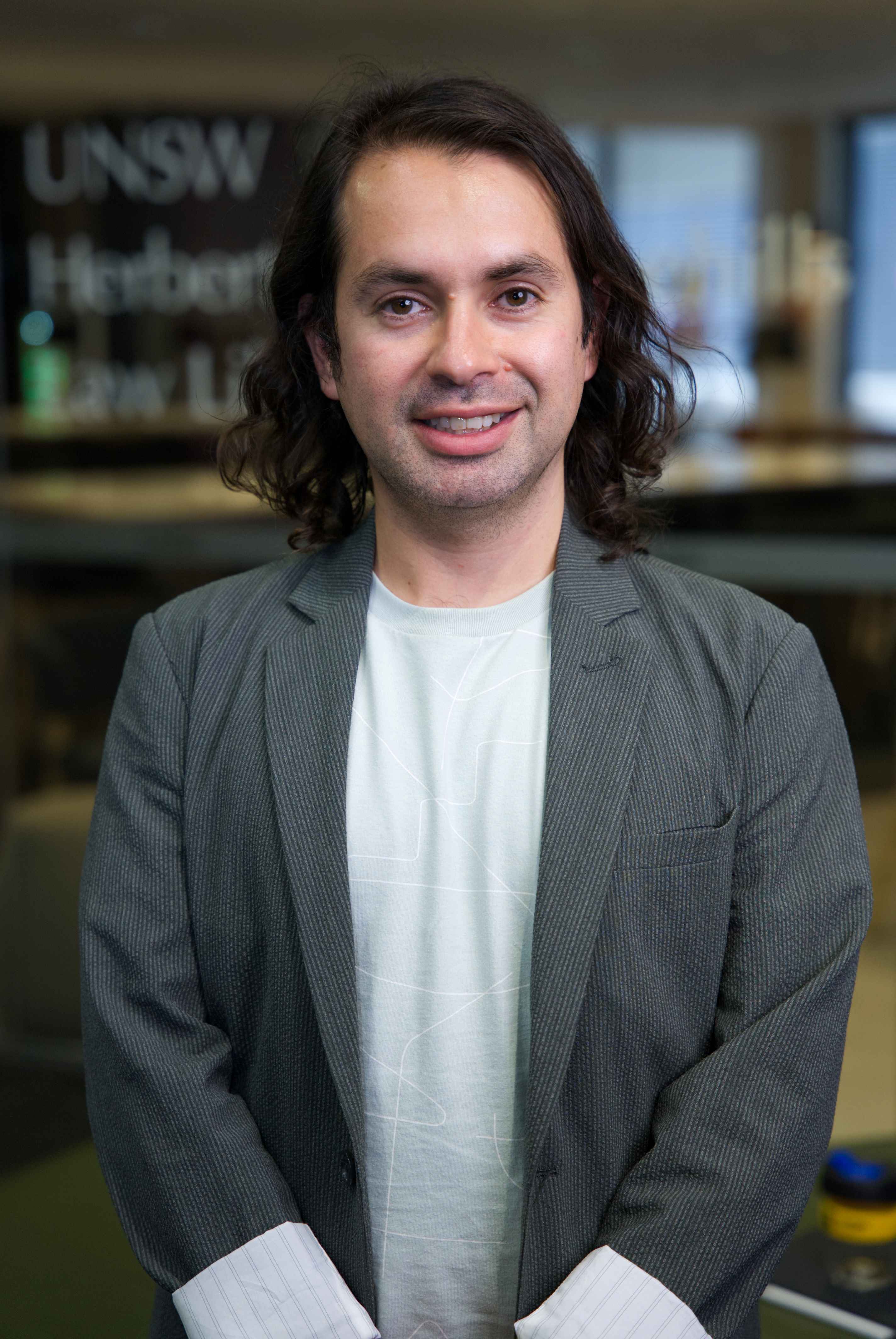

Tutorial Team
- ACTL3142 tutors (T1): Jim Denne, Nick Guo, Jason Khu, Tirth Thakker
Course aims
What will I get out of taking this course?
- Practical skills for building predictive/classification models.
- Understand how these models work (and when/why they don’t work).
- How to interpret your models’ results.

Course Contents
The schedule for each week’s topics are:
Regression theory
- Intro + Simple Linear Regression
- Multiple Linear Regression
- Logistic Regression
- Generalised Linear Models
Machine learning
- Cross-Validation & Regularisation
- Flexibility Week
- Moving Beyond Linearity
- Tree-based Methods
- Unsupervised Learning
- TBC: Industry Guest Lecture
Learning activities
Learning activities
- Self-study:
- Read relevant textbook chapters and do end-of-chapter questions (conceptual and applied).
- Refer to the course website “home” for the reading list.
- Please don’t skip those readings! They will help you solidify your knowledge and achieve that sweet HD you have been dreaming about.
- Lectures:
- Actively engage in the “face-to-face” lecture.
- If needed, we may provide extra lecture recordings (whenever in-class time is not enough to cover all content).
Learning activities (continued)
- Labs (aka “tutorials”):
- Questions are on the course website.
- Have a go at them yourself, after the lecture (ideally before your tutorial).
- Some questions are marked by a “star” (\star). Those are your “top priority” questions to attempt, but the other questions also provide relevant practice.
- Actively engage in your face-to-face tutorial.
Course website
At https://unsw-risk-and-actuarial-studies.github.io/ACTL3142/
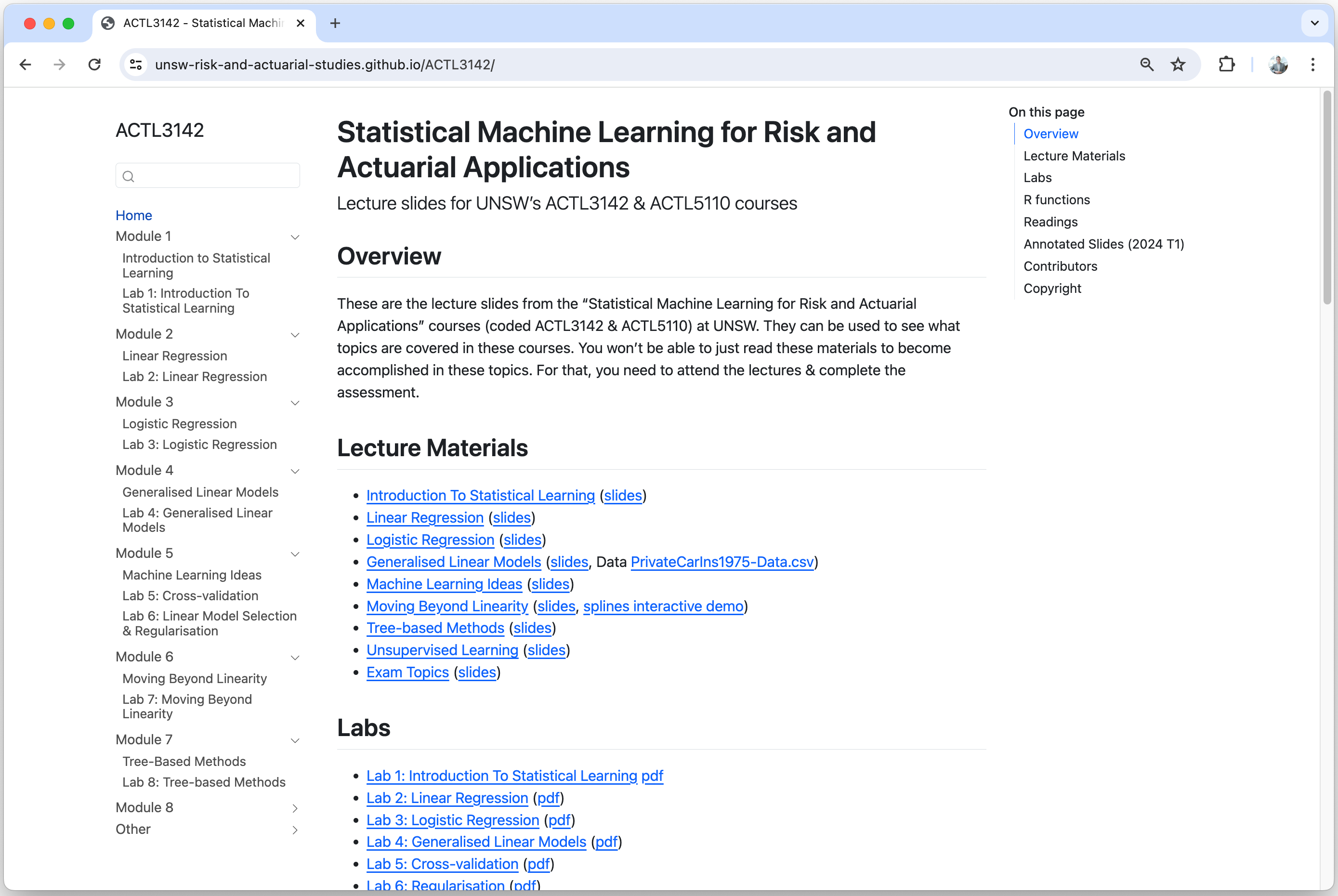
Also available by https://laub.au/ml
Course textbook
James, G., Witten, D., Hastie, T., Tibshirani, R., An Introduction to Statistical Learning with Applications in R, Springer, 2nd version, 2021
- Book
- Free electronic copy
- R labs with detailed explanations
- A lot of resources including crowd-sourced solutions to questions
- We will cover most of the material in this book.
- Has a focus on intuition and practical implementation.
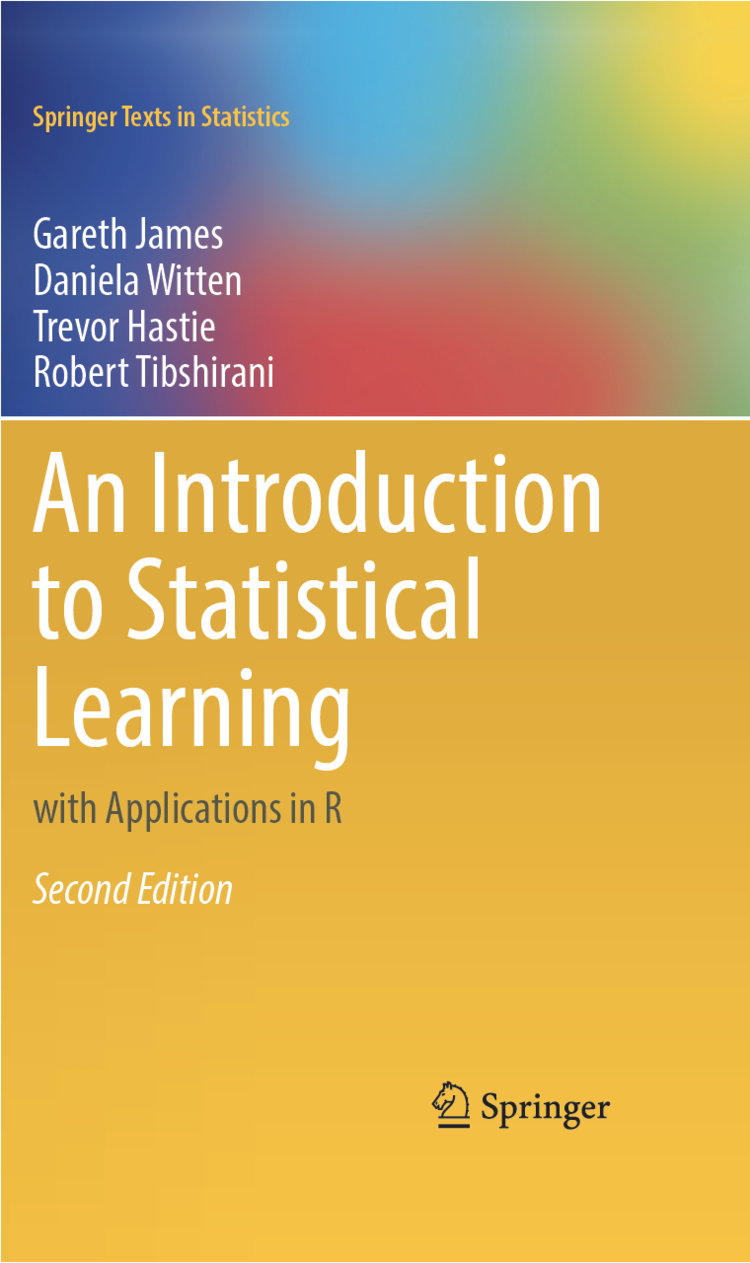
Moodle
Because the course content is available on the Website, we make a minimal use of Moodle. You will find on Moodle:
- Basic course info.
- Lecture recordings (Echo 360).
- Assessment submissions.
- Links to the other platforms we rely on (e.g., course website and “Ed Discussion”).
Ed Discussion
- Ed Discussion is the course’s primary mode of communication.
- Official announcements will be posted there.
- Students should ask all their questions (about theory, the running of the course, assessments, etc.) on Ed.
- You must open the Ed Forum at least once in order to be enrolled and see announcements.
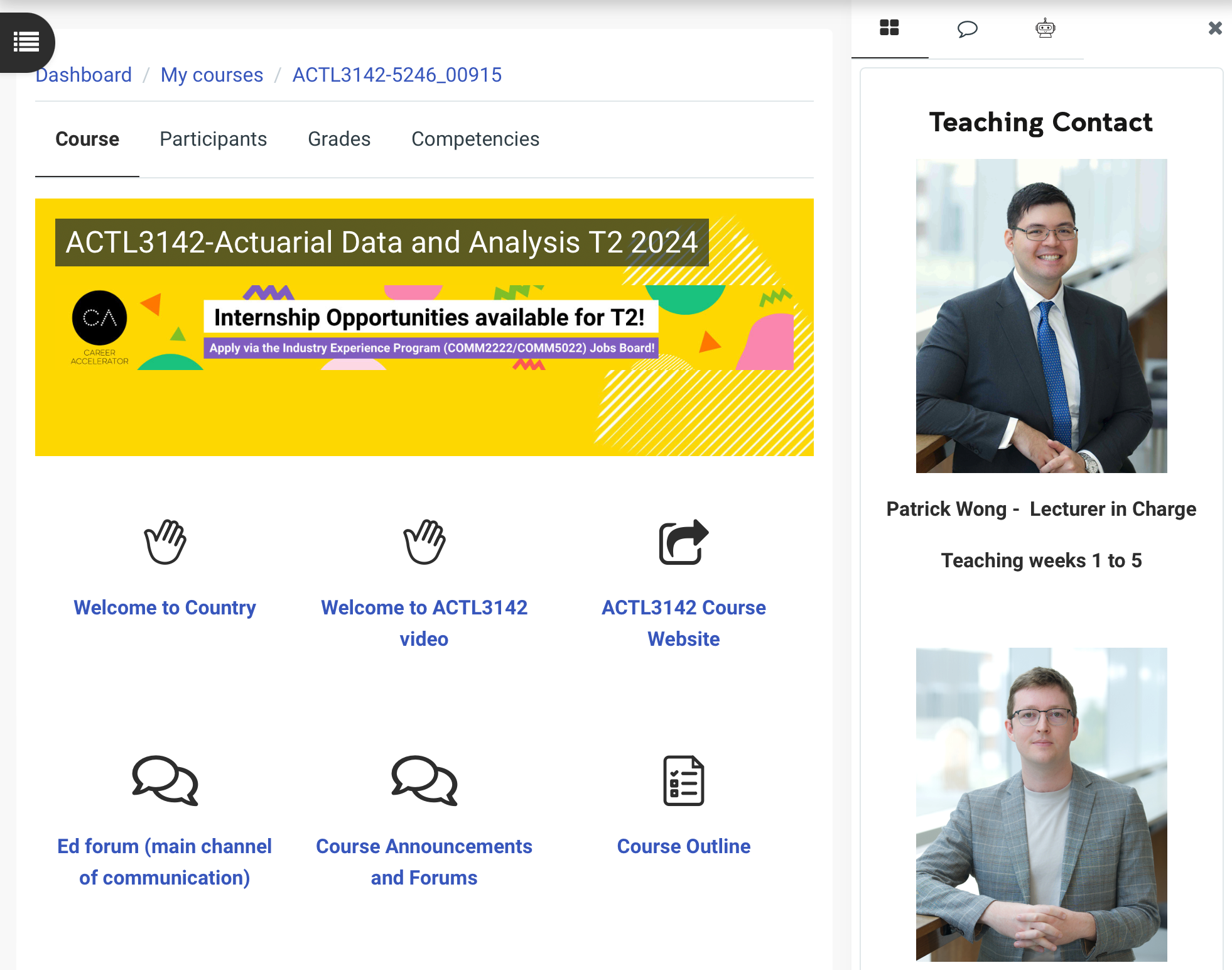
Ed Discussion II
The benefits of asking questions on Ed:
- It allows you to get help at any point along the course. Please don’t be shy to ask anything. We are here to help, and if you have a question, it is very likely someone else in the course has the exact same question!
- It creates a community. As you see that other students have questions, you realise you are not struggling alone. It also gives you the opportunity to help others. If you know the answer to a question, please answer! One of the best ways to solidify your understanding is to explain your answer to someone else. Try it!
- It makes the teaching staff happy, as they don’t have to answer the same question twice (as opposed to answering questions by email). And you want the teaching staff to be in a good mood (especially when they grade your assessments), don’t you?
Ed Discussion III
Some tips on the best use of this Q&A Forum:
- Before posting, check through the lecture notes / course content to see if you can answer your question yourself. We ask you to please try before posting, as we don’t want the forum to become your crutch (after all, the forum won’t be available in the final exam).
- Search before you post: maybe your question has already been answered.
- Be specific in your question and include any attempt you have already made to solve it. We won’t answer vague questions like “I don’t understand Exercise X”. Please tell us exactly where you are stuck.
- Show some love by “heart reacting” questions and answers you find useful.
- You are encouraged to answer other students’ questions (we will monitor those to be sure no false information is communicated).
Ed Resources
- When you are on “Ed Discussion”, in the top right you will see a tab called “Ed Resources”.
- While most of the course material is on the Website, we will post on “Ed Resources” files that are specific to a UNSW cohort of students (and that would have no business being online).
- For example, we may put on Ed Resources: assessment files, global assessment feedback, annotations made in-class, past papers.
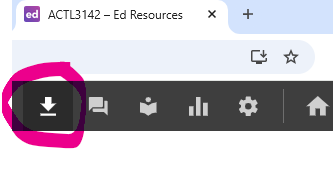
Assessment
Course Grade Breakdown
- Formative Assessments (10% max)
- Introduce Yourself (1%)
- StoryWalls (5x3%)
- Assignment (30%)
- Part A (12%)
- Part B (18%)
- Final Exam (60%)
What is StoryWall?
The formative assessments are designed to encourage you to engage with the course content and start experimenting early, without the fear of needing to be 100% correct. You will complete them by submitting posts to specific Moodle forums. There are two steps for each StoryWall:
- You must attempt every component of the question, and clearly show your written solutions to every component, and
- You must record a screen-capture where you explain line-by-line the code you have used to produce your answers. This requirement serves two purposes:
- To improve your own understanding (explaining something to others is the best way to ensure your understand it yourself).
- To help students who use A.I. tools to critically think about the outputs obtained from such tools, and to make sure they understand those outputs.
Detailed instructions will be available on the course Moodle site, under Section “Assessments Hub”.
StoryWall Grading
- StoryWalls are graded on a “pass/fail” basis (you get the marks or you don’t).
- While those tasks are formative and we don’t expect “perfect answers”, you must attempt every component of the tasks. In particular, your video recordings must explain your code in detail, line-by-line.
- Missing a component or providing only vague code descriptions, even if the rest of your submission is high quality, will result in a 0.
- There are 5 StoryWall tasks, each worth 3% each (but your total for “Formative Assessments” is maxed out at 10%). They are due on Friday at 11:55 am in Weeks 3, 4, 7, 8, 10.
Pro tip: aim to get 10/10 marks for this…
Project (30%)
Part 1 (12%)
- Due Week 5 Friday 11:55am.
- This will be a data science task using the techniques you learn from the “regression theory” part of the course.
Part 2 (18%)
- Due Week 9 Friday 11:55am.
- This will follow from the previous task, but you will use any technique seen in the course, including what you learn in the “machine learning” part of the course.
Due dates
All due dates are at Friday 11:55am of the following weeks:
- Introduce Yourself
- \emptyset
- StoryWall 1
- StoryWall 2
- Assignment Part 1
- \emptyset
- StoryWall 3
- StoryWall 4
- Assignment Part 2
- StoryWall 5
Late policy
For the Formative Assessments, we do not grant any special consideration, and you cannot submit a task late. This is because you already have the possibility of missing two 3% tasks and still get the full 10/10 mark, if you successfully complete the other tasks. View this has an “automatic” special consideration mechanism.
For the Assignment, if submitting late, you must apply for special considerations through UNSW central system. If you ask the LIC for an extension, they will be cranky and refer you to the special consideration system. The general late policy is:
Late submission will incur a penalty of 5% per day or part thereof (including weekends) from the due date and time. An assessment will not be accepted after 5 days (120 hours) of the original deadline unless special consideration has been approved.
Example: Late policy for Assignment Part 2
Assignment Part 2 is due Week 9 Friday 11:55am.
If you submit without special consideration on:
- Week 9 Friday 11:55 am, you have no late penalty.
- Week 9 Friday 11:56 am, you have a 5% penalty.
- Week 9 Saturday 11:56 am, you have a 10% penalty.
- Week 10 Sunday 11:56 am, you have a 15% penalty.
- Week 10 Monday 11:56 am, you have a 20% penalty.
- Week 10 Tuesday 11:56 am, you have a 25% penalty.
- Week 10 Wednesday 11:56 am, you will get 0 marks.
Example: a submission on Saturday 11:56 am (10% penalty) which was initially graded as 80/100, would be recorded as 70/100 (we subtract 2\cdot5\%=10\%).
Plagiarism and ChatGPT
Plagiarism
Do not send or show your work to another student. You will be penalised along with them!
If you use something directly from an external resource, cite the source.
ChatGPT and other LLMs
You will add a “Generative AI usage” appendix to your reports, detailing how you used AI (what outputs, what prompts).
If you do not use AI, then you will still need the appendix that says that.

Exam
We have many years of past exams for you to practice on, though the last few exams (2023-2025) are the most appropriate for the current edition of the course.

Past Student Feedback
Past Student Feedback
- The next few slides contain real feedback from students (some good, some less good) from myExperience surveys. One recurring theme in this feedback is the prominent “practical” and/or “computer science” aspect of this course (seen as either a positive or negative thing):
“Reflection: This course has been great! Personally the ACTL3142 course introduced me to statistical machine learning and data analysis techniques used in actuarial work. However, as I delved deeper into the course, I found myself more drawn to the underlying mechanisms of these predictive models and statistical learning techniques. I became more interested in the ‘how’ rather than the ‘what’. This curiosity led me to explore the field of computer science, which forms the backbone of these data analysis techniques.This curiosity led me to explore computer science, which provides a deeper understanding of these tools. This shift in interest from application to creation is why I’m considering changing my degree from actuarial to computer science!” (2023 T2)
Some loathed how practical this course was
“ACTL courses is meant to be all about applying mathematical theory, we arent compsci people who writes 500+ lines of code per assignment. We are not enrolled in compsci degrees for a reason but now we are forced to do a half theory half compsci course. The theory isnt math heavy either, its more about learning and interpreting models, instead of performing calculations. Even if you want us to do heavy assignments like this one, at least give us R tutorials which cover all the relevant code that we need???? We have compsci’s heavy assignment but no spoon feeding code like compsci lectures at all????? Also, 30% for the assignment is way too much, we want the 70% finals instead of 60%.” (2023 T2)
Our perspective
This course will require you to complete a substantial amount of programming. It is not a computer science course by any measure, but for some students (depending on your background) this will be quite a big step up in the size and difficulty of the coding tasks.
Statistical/machine learning coding can be a very enjoyable component of your whole degree, though simultaneously it can be one of the most frustrating parts. There is no way to progress in your skills without simply making a lot of mistakes and learning from them. Please view this course as a safe environment to learn these skills, and potentially make some mistakes now. You will then have the capability and confidence to make informed decisions later in your career based on rigorous understanding of machine learning.
Your future career will likely contain a sizeable data science / statistical programming element. This is a key part of your chosen profession, and in fact, if you complete this course and realise that you are truly averse to any coding, it is perhaps worthwhile to reflect on your career path now.
Suggestion: get a rubber duck
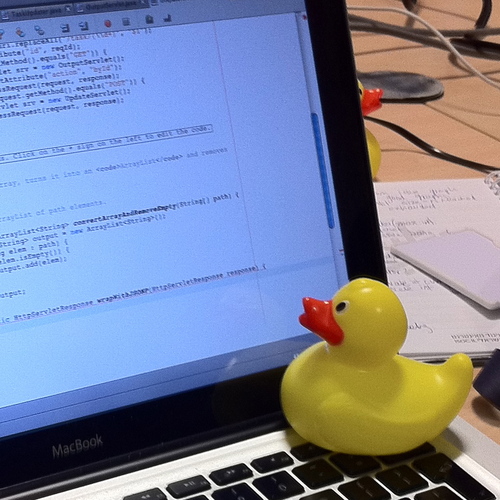
What were the best things about this course?
“I really enjoyed the mulitmodel options for learning. Having access to both a course website, the textbook, in person, and recorded lectures really fostered a strong learning environment for me.” (2025 T1)
“I truly enjoyed every aspect of the course, from the ordering of the lecture topics, to the course website’s formatting / interactivity, a highly relevant textbook to pre–read from, and useful formative assessments.” (2024 T2)

What were the best things about this course?
“chill vibes overall” (2024 T2)
“The discussion questions were extremely helpful given that they helped prepare us for the assignments and provided us the opportunity to see what our peers were doing and how I could better improve my thought process.” (2024 T2)
“The variety of course content was very engaging. I like how the course was split into 2 sections so that we were shown multiple ways to build different models for different purposes.” (2024 T2)
“I think this course was excellent, while maybe not my favourite topic, it is probably one of the most well taught courses that’ve I’ve done (for context I’m a third year). It blends very interesting theory with a lot of practical components and two aspects of the course complement each other very well. It’s a well structured class, from the assignments, to the labs, to the website, to the kaggle, and I’m very happy about it.” (2024 T2)
“Course website is great!! I LOVE when courses take the time to make their own website (Moodle is so clumsy). The course website is so well set out with lab questions and course content, lecture slides, INTERACTIVE DEMONSTRATIONS and code examples. Just really intuitive. This is the sort of resource that I feel all courses should be providing.” (2024 T2)
“Very practical and hands on so could learn to apply concepts while figuring out how to understand them” (2024 T2)
“ASSIGNMENT. This is how I believe all assignments should be, directly correlated to the course content learnt in the term and building genuine practical skills. Being split into 2 parts was almost necessary I would argue and the thoughtfulness of the team to give leniency on submission date reduced my stress and helped me maintain my enjoyment of the course.” (2024 T2)
“I really liked the dedicated website with all the information from the lectures and the code used. It was very helpful for the assignments. I was in general positively surprised by the course. It sparked an interest in ML that i didn’t know I had until now and i plan to have further modules looking into this field, potentially to work there.” (2024 T2)
“I really enjoyed how practical this course was (i.e. it is very applicable to real life). I was in an interview and my interviewer was talking about different models like GAM’s and I could actually understand what she was saying!” (2024 T2)
“I really enjoyed practicality of the course, where i felt it is something I could genuinely use in the workforce.” (2024 T1)
“The content was really interesting and very practical. Really sparked my interest in data science and modelling in general.” (2023 T2)
“Refreshing focus on the theoretical and application aspects and constructions of models rather than mathematical/numerical focus.” (2023 T2)
“the textbook readings were super helpful in getting us to read the concepts in more detail” (2023 T2)
“This was one of the best ACTL courses I have ever taken. It has stimulated my interest in data analytics and modelling and I am so glad that the course is structured the way it is. Please do not change anything about the course or the lecturers, they were amazing.” (2023 T2)
“There were a few things I really loved about this course. The course content wasn’t too mathematics focused. It was nice to take a break from all the hardcore calculus. This my first ever machine learning course and it was very cool to see how machine learning works.” (2023 T2)
What could be improved?
“The course covers way too much content, and I often felt overwhelmed. It needs to be clearer that this is a still a statistics/math course with a lot of derivations. I had expected more practical or applied material, but most of the lectures focused on theoretical concepts. It was also surprising to hear that the exam would include derivations, as that wasn’t something I had anticipated based on the overall content and emphasis in the lectures.” (2025 T1)

What could be improved?
“Assessment structure. The assignments were arguably too lengthy and there were two instead of the usual one for an actl course (so it was like putting in 3 times the amount of work that you would normally put, for the same 30% as any other actl course) Marks being received after the final exam is sub optimal” (2025 T1)
“Too much content in 9 weeks. Giving me nightmares.” (2024 T2)
“Perhaps starting the term with less content–heavy topics could help ease into the course? However it is understandable that there is a limited amount of time to cover a wide array of topics.” (2024 T2)
“Only the latter half of the term felt a bit less structured and confusing, but that may have just been due to the nature of those topics, which were significantly less interrelated compared to the topics of the first half.” (2024 T2)
“provide a bit greater variety of examples for R code/lab questions because not everyone comes from a compsci background and it can feel like running into a brick wall over and over trying to apply lec content to r code.” (2024 T2)
“If possible make the readings more concise so it doesn’t include whole chapters since towards weeks 8–10 when all courses have assignments due students forget about readings which creates setbacks” (2024 T2)
“The assessment task at times was difficult to navigate, as there wasn’t any solid way to check if we were going in the right direction and the results obtained actually made sense, and was relevant to what was specifically required by the course.” (2024 T2)
Time management, readings and coding themes
Is there anything you wish you could have told your former self before starting to help them be prepared to learn these topics?
“If I could advise my past self at the start of this course, I would emphasise the importance of hands-on practice with R from the very beginning. While the theoretical foundations are crucial, I found that my understanding deepened significantly when I applied concepts in coding exercises. I would also encourage myself to engage more actively in discussions with peers and instructors, as collaborative learning often led to valuable insights.” (2024 T2)
“I definitely wish I would’ve read the textbooks readings before each lectures as I found it very helpful to watch the lecture and then read the readings to cross-clarify my understanding of each week’s topic.” (2024 T2)
“I think reading the textbook before attending the weekly lectures would have been really beneficial to me. This would have allowed the lecture to consolidate what I had read and then I could recognise areas that weren’t making sense while it was fresh in my mind and with easy access to the lecturers to answer my questions. Furthermore, refreshing myself with R before this course would have been really helpful because there were a couple features that I needed to be reminded of.” (2024 T2)
“If I could go back and give advice to my former self, I would emphasize the importance of staying consistent with the coursework and actively participating in the lab sessions. The hands-on experience gained in the labs is invaluable and directly complements the theoretical knowledge gained from lectures. I would also suggest spending more time understanding the underlying mathematics of machine learning algorithms, as this would make the implementation process much smoother.” (2024 T2)
“I wish I told myself to be more attentive in lectures and manage my time better, which impeded my learning and also my performance on the assignment, which was really interesting but made difficult by my poor time management.” (2024 T2)
“I would tell my past self to actually put in the effort to do the readings every week as the ISLR2 textbook was really well-written and ended up helping me out a lot. I also would have told my past self to brush up on R as I was quite rusty going into the course after not really coding in R for a while and it took me a little bit of time to get back into it.” (2024 T2)
“I would have told myself to develop a timetable and to-do list to help better learn the topic. Cramming in lectures, tutorials and textbook readings after procrastination sometimes made it difficult to fully understand content as I was rushing through it.” (2024 T2)
“I would tell my former self to prepare beforehand on basic statistics topics and R programming before starting the course. It would have made the initial weeks much easier. Also, don’t underestimate the value of lab sessions, they’re incredibly helpful for understanding the material so I would have attended more classes.” (2024 T2)
“As a college returner, I’ve found the course immensely valuable. It has opened my eyes to the field of machine learning, and I’ve garnered many ideas while completing the assignments. However, lacking any background in R programming has made adapting to the lab materials quite challenging. If I could offer advice to my past self regarding course preparation, I would suggest learning R first.” (2023 T2)
“Something i wish i could have told myself at the start of the term was to truly learn and understand the R codes behind modelling and what each function means.” (2023 T2)
“If I could have told myself one thing before starting this course, it would have definitely been to manage my time effectively and spend more time on exploring further questions in coding through R as I particularly struggled to manage my workload when working on the assignment and would have benefitted if I started it earlier or had a much better understanding of coding in R.” (2023 T2)
“If I could advise my past self on something, I would say brush up on R before beginning the course, and get better at using if functions mainly.” (2023 T2)
“If I were to go back in time and tell myself one thing, I would definitely tell myself to not underestimate the time it takes to code these models, as they took significantly longer than I expected - having a deep understanding of how these models work is important, yes, but so is learning how to code them so they run quickly and efficiently in R.” (2023 T2)
“If there was anything I wish I could have told my former self before starting, it would be to start studying and try to stay as up to date as possible as I believed that due to being behind, I missed out on some details that I should have incorporated into the assignment and would cost me marks. Also, I would’ve told myself to learn how to write a report properly.” (2023 T2)
“Furthermore, I would have told myself to keep more on top of the course readings as I had missed some throughout the term. Additionally, I could have spent more time on some content I found difficult such as the unsupervised learning content.” (2023 T2)